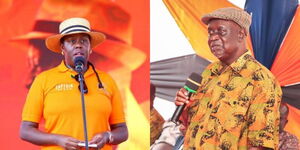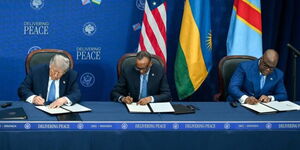Former ICC prosecutor Luis Moreno Ocampo and the Government of Kenya have been adversely mentioned as major hindrances that led to the dismissal of the charges against President Uhuru Kenyatta, Deputy President William Ruto and journalist Joshua Arap Sang in December 2014.
In a damning report released by ICC prosecutor Fatou Bensouda, Ocampo has been accused of underestimating powerful Kenyans who, in her account, used all means to bring down the cases especially through witness intimidation.
“Indeed, Prosecutor 1 (Ocampo) dismissed, without explanation, concerns voiced to him about whether the ICC could take on targets that were powerful, sophisticated, well-funded and organized, given the problems within the Victims and Witnesses Unit (VWU) at the time,” reads the report.
Bensouda also alleged that the prosecutorial process was also hampered by deadlines set by Ocampo based on considerations other than sound prosecutorial practice.
“The prosecutorial process in the Kenya cases, the experts found, was hampered by deadlines set by the first Prosecutor that was based on considerations other than what they considered to be sound prosecutorial practice,” read the report.
“Despite circumstances which alerted the OTP to the very real potential for witness interference and the interference itself, the OTP was dilatory in robustly responding to the interference, e.g., delaying comprehensive Article 70 investigations until too late in the process,” further read the report.
Further, the report mentions the Government of Kenya as a key player in obstruction of justice for the victims of the 2007/2008 post-election violence.
“The GoK did not support the OTP investigative activities, instead it either allowed interference with witnesses inside and outside of Kenya and with OTP activities in Kenya, including surveillance of OTP investigators and/or may have been directly involved in such interference,” stated Bensouda.
“It refused Requests for Assistance (RFAs) thereby hampering the OTP’s ability to access potential evidence, or imposed such conditions or access as to, in reality, make that access so cumbersome as to be unworkable,” further stated the prosecutor.
The firebrand prosecutor further gave damning information indicating heinous acts meted on witnesses who would have helped strengthen the prosecution's case.
“The witnesses were directly contacted and intimidated, bribed, perhaps even physically harmed or killed. The relatives of these witnesses were also contacted and intimidated or pressured to convince the witnesses to refuse to cooperate with the OTP,” read Bensouda’s statement.
“As a result, many individuals on whom the OTP planned to rely as witnesses either recanted their earlier statements or refused to appear before the court,” further read the statement.
Additionally, the report showed that continued cooperation of these insiders was constantly threatened by a pervasive witness interference campaign, exacerbated by the difficulties encountered with the witness protection program at that time.
Prosecution of the popular “Ocampo six” was initiated in 2010 in a bid to establish justice for victims who were killed after the 2007 post-election chaos that erupted in various parts of the country.
According to the ICC, more than 1,200 people were killed in the violence pitting sharp differences between supporters of ODM party leader Raila Odinga and PNU’s Mwai Kibaki.
Others who were implicated in the initial charges included former head of public service, Francis Muthaura, former police commissioner, Hussein Ali and former Minister for Internal Affairs Henry Kosgey.












